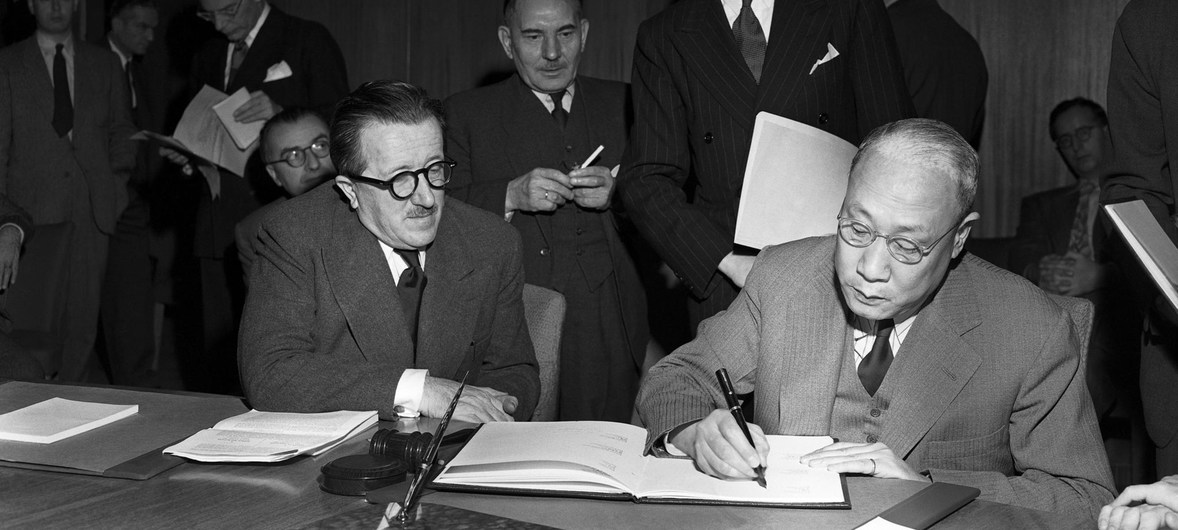In the aftermath of World War II, the international community came together and agreed upon one of the most vital treaties of our time – the Geneva Conventions of 1949. The treaty, made up of four conventions and three additional protocols, “established the modern, international legal standards for humanitarian treatment during times of war.”[1] Included in the conventions are the protection of (i) the Wounded and Sick in Armed Forces in the Field, (ii) the Wounded, Sick and Shipwrecked of Armed Forces at Sea, (iii) Prisoners of War, and (iv) Civilians.
At the core of the treaty lies the Fourth Convention, focusing on the protection of civilians in times of war, as this was the first humanitarian law treaty focusing specifically on civilians.[2] Article 3 of the Fourth Convention states that “persons taking no active part in the hostilities, including members of armed forces who have laid down their arms and those placed hors de combat by sickness, wounds, detention, or any other cause, shall in all circumstances be treated humanely…”[3]
Today, 70 years after the signing of this unprecedentedly successful treaty on the protection of humanity, the moral pillars of the four conventions seem shattered. When looking at the conflicts in Syria, Yemen, Mali, Ivory Coast, Iraq, Afghanistan, and so on, it is clear that modern war tactics no longer abide by the 1949 conventions. Attacks in these war-torn countries include “siege, attacks on hospitals, sexual violence and the arbitrary execution of detainees.”[4]
“If you look historically at where the law of armed conflict came from, it’s about mutually advantageous reciprocity, it’s in the interests of both to have some restraint”, David Rodin, a moral philosopher and co-director of the Oxford Institute for Ethics, Law and Armed Conflict, points out.[5] He adds, “So what do you do when you have a foe who is not interested in that reciprocity? There’s no benefit to us in behaving well if the enemy doesn’t.” This question has not only come up recently, regarding the Islamic State’s (ISIS) tactics, and their defeat, but has spurred since the beginning of the War on Terror.
After a 2015 bombing attack on a Medecins Sans Frontieres/Doctors Without Borders (MSF) hospital in Afghanistan, Joanne Liu, president of MSF was outraged. She had reassured her staff in the Kunduz hospital that they would be safe, as all fighting forces in the region knew the exact location of the hospital, and would not harm medical personnel, due to the special status hospitals and doctors hold.[6] This mistake, which caused the loss of 30 lives, including 13 MSF staff, caught the attention of Human Rights Agencies, starting to question how committed countries still are to the Geneva Conventions.[7]
With non-conventional warfare on the rise, and non-state militant groups such as ISIS, who are not parties to Geneva Conventions, in combat with legitimate militaries, navigating the limitations of humanitarian law and the laws of armed conflict has become difficult. Many scholars have concluded that states’ violating humanitarian law and the Geneva Conventions in the context of counterterrorism has, in fact, negatively impacted people who these treaties seek to protect, such as sick and wounded fighters and civilians.[8]
The question arises then, how states’ counterterrorism strategies can abide by international treaties, which the enemy’s side is not a party to. While the Geneva Conventions, as well as other humanitarian law treaties, might have to be updated to include answers to such questions, Peter Maurer, President of the International Committee of the Red Cross, maintains that the Geneva Conventions represent “one of the greatest achievements of inter-State cooperation” and “symbolize our enduring and common humanity”.[9]
- Amidst New Challenges, Geneva Conventions Mark 70 Years of ‘Limiting Brutality’ During War, UN News (Aug. 13, 2019), https://news.un.org/en/story/2019/08/1044161 [Hereinafter Amidst New Challenges]. ↑
- Id. ↑
- Geneva Convention Relative to the Protection of Civilian Persons in Time of War art. 4, Aug. 12, 1949, 6 U.S.T. 3516, 75 U.N.T.S. 287. ↑
- Imogen Foulkes, Geneva Conventions Laws of War ‘Need Fixing’, BBC News (Dec. 8, 2015), https://www.bbc.com/news/world-europe-35023029. ↑
- Id. ↑
- Id. ↑
- Id. ↑
- The Tensions between Counterterrorism Approaches and International Humanitarian Law/Principled Humanitarian Action, International Peace Institute (Apr. 2018), https://www.ipinst.org/wp-content/uploads/2018/05/IPI_April-26-workshop_Background-paper-2.pdf. ↑
- Amidst New Challenges, supra note 1. ↑


